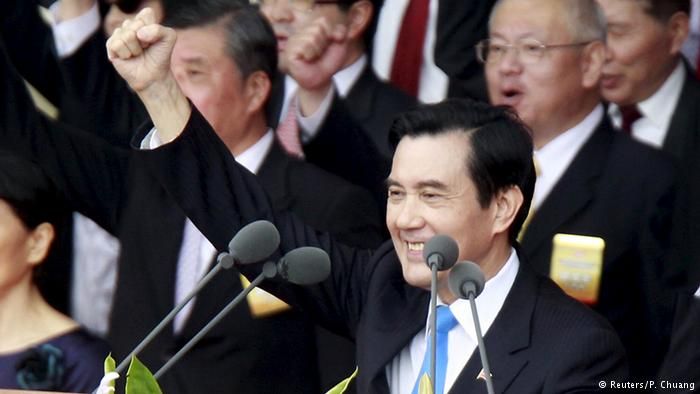 The leaders of China and Taiwan will take part in the first official meeting between the two since separating in 1949. Attitudes toward Beijing have created a hostile divide in Taiwan's political landscape.
The leaders of China and Taiwan will take part in the first official meeting between the two since separating in 1949. Attitudes toward Beijing have created a hostile divide in Taiwan's political landscape.
China's President Xi Jinping and his Taiwanese counterpart Ma Ying-jeou (pictured above) will meet in Singapore this weekend, Ma's office announced on Tuesday.
It marks the first meeting between leaders from the two bitter rivals since they split in 1949 after a long civil conflict.
Ma's spokesman said the Saturday meeting would focus on "cross-strait issues," and was meant to ensure continued peace - but that no official agreement would be signed and the presidents would issue no joint statement at the end of the proceedings.
But Chinese officials are saying the meeting would be a milestone in relations.
"This is pragmatic arrangement given the situation of the irresolution of cross-strait political differences and one on the of the one-China principle," Zhang Zhijun, head of China's Taiwan Affairs Office, the official Xinhua news agency in Beijing reported. "I believe the meeting will gain wide support from all walks of life across the Strait and the international community."
Forces loyal to nationalist leader Chiang Kai-shek fled to the island of Taiwan following defeat at the hands of Mao Zedong's communists. Ruled separately since then, both sides consider themselves the legitimate government of both Taiwan and mainland China.
Bitter divide over relations with Beijing
Relations between the two initially warmed when Ma came to power in 2008, though recent fears over Beijing's growing military and economic influence have dampened that somewhat.
When Ma steps down next year after his two-term limit is up, the opposition China-skeptic Democratic Progressive Party (DPP) is expected to assume power.
DPP leaders have complained that the Tawainese government had failed to keep its own parliament in the loop.
"This kind of situation needs to be explained fully to the people and calm down the anxiety of the people in Taiwan that President Ma has not overpromised China anything that would hamper Taiwan's current status and its long term interests," Joseph Wu, secretary-general of the DPP, told the Reuters news agency.
Ma's Kuomintang (KMT), whose history goes all the way back to Chiang Kai-shek, suffered its heaviest election losses ever last year in local votes, with its China-friendly strategy taking most of the blame. Some feel that the openness to Beijing helped tourism and big business, at the expense of ordinary Taiwanese people.
The KMT adheres to the "1992 consensus," a tacit understanding between the party and Beijing that there is only one China - but that each side is allowed to follow their own interpretation of what that means.
Ma has warned against the consequences of rejecting the 1992 consensus, but the DPP has remained steadfast in rejecting it.
Source: AFP
 В Атырау -10
В Атырау -10